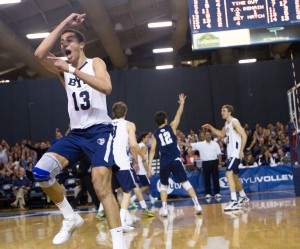The transition from high school to college is tough for students. The degree of difficulty is amplified for student-athletes.
BYU does its best to ease that burden for athletes though.
Common adjustments that student-athletes experience include learning to take school seriously, balancing time and getting physically stronger to compete at a higher level of athletics. Perhaps the biggest adjustment is a psychological one. Many athletes go from being worshipped superstars in high school to average role players in college.

Cory Calvert was a freshman on the basketball team this year. Calvert was a superstar in high school. He was the 5A MVP and first team all-state his senior year, averaging over 22 points, six rebounds and five assists while leading his team to the state championship. Throughout his first year of college, he averaged under two points, one assist and one rebound per contest. Calvert still got valuable minutes this season and maintained a positive attitude throughout the experience.
“You want to do as much as you can, but as a freshman you’re just happy to be on the team and contribute in any way you can,” Calvert said. “That’s what I did this year. The coaches told me work as hard as you can, and basically my success is up to me and how hard I work and what I put into it.”
Calvert felt like he improved his game and got stronger throughout the year. He made many friends living in the dorms and felt like he had a good overall experience. His professors and his team also helped him keep up with his schoolwork throughout the season, even on the road.
“They gave us some time to do homework, and we had study hall sometimes on the road, so that was good to stay caught up,” Calvert said. “Our professors were really good about working with us and helping us out if we went in and talked to them.”
Bennett Bird, a freshman on the volleyball team, was also a high school superstar but struggled to find playing time this year. He was an all-American his senior year and was a member of both the U.S. Junior National team and the Youth Beach National team. He didn’t play in a match this season and plans to redshirt this year, but his mother, a former college volleyball player, prepared him for this situation.
“My mom didn’t even touch the court until her junior and senior year,” Bird said. “She always said, ‘Don’t even think about not playing.’ She prepared me and helped me wrap my head around the idea of working hard for every single bit of time on the court.”
Bird’s requirements for choosing a college to attend included that the school have a good volleyball program and good academics. He chose to attend BYU, despite not being a member of the LDS Church, but has made many friends and has found that he relates to many of the students here.
“(It was) interesting that in my Book of Mormon class this semester I made a couple of good friends,” Bird said. “From a non-LDS perspective, I wanted to come here because there’s less distractions. I think that it was the right choice for me, and I think I’ve succeeded so far. I’ve have had a great time doing it.”
Matt Freeman has been a manager on the basketball team for three seasons and has seen his fair share of freshmen come through the program. He said freshmen are treated fairly by their older teammates.
“The freshmen are treated really well,” Freeman said. “The guys on the team do a very good job of reaching out to them and making sure they know what’s going on. They get the same amount of joking around that everybody else gets on the team. The upper classmen do a good job making sure they’re along for the ride.”
Freeman also believes that although the academic adjustment is difficult, the athletes are given every opportunity to succeed. They have access to the student athlete building, which provides them tutors, time-management counselors and people that are interested in the athletes’ succeeding in school.
“Coming in to college, it’s just a different dynamic academically than anything they’re used to before,” Freeman said. “Academically, it’s a little tough for a lot of people to stay caught up, especially for athletes. They’re putting so much time into their sport and practicing and lifting and doing everything to stay in shape, so it’s just finding the time.”
Many athletes in other colleges initiate freshmen onto sports teams by hazing and intimidation. A general belief is that crazy acts garner unity, camaraderie and respect. A report by ESPN from 2002 suggests that up to 79% of athletes are hazed in their college career.
“(Hazing is) any activity expected of someone joining the group that humiliates, degrades, abuses or endangers, regardless of the person’s willingness to participate,” the ESPN article reported. “One of the most pervasive beliefs in sports is that hazing, or initiation, builds unity. They think it’s something good.”
Ben Patch, a freshman on the volleyball team, said that isn’t the case on BYU teams.
“Being a freshman on the team can be kind of intimidating, but this team works really hard to make sure everyone feels comfortable and feels good,” Patch said. “It’s a brotherhood, and I think it was really easy to transition to this team because there’s so much love and support for each other.”




